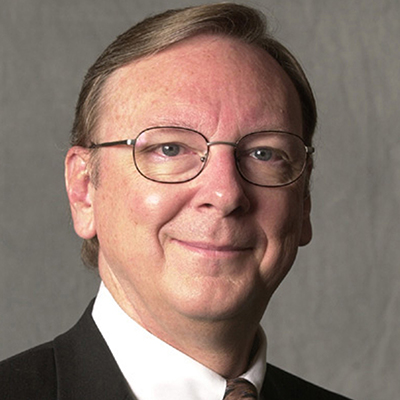 Dr. Michael Collins was a 5th grader when he got his first job. He grew up “on the wrong side of the tracks,” as he puts it, in a single-parent family that had to rely on welfare. When he expressed his interest in a career in medicine, he was told that that goal was unobtainable, that he’d never succeed, that he didn’t have familial or financial backing. It makes sense, then, that one of Dr. Collins’s proudest moments in his career was also one of the earliest: his graduation from medical school from the University of New Mexico with honors from Alpha Omega Alpha (AOA).
Dr. Michael Collins was a 5th grader when he got his first job. He grew up “on the wrong side of the tracks,” as he puts it, in a single-parent family that had to rely on welfare. When he expressed his interest in a career in medicine, he was told that that goal was unobtainable, that he’d never succeed, that he didn’t have familial or financial backing. It makes sense, then, that one of Dr. Collins’s proudest moments in his career was also one of the earliest: his graduation from medical school from the University of New Mexico with honors from Alpha Omega Alpha (AOA).
Dr. Collins is originally from San Francisco, raised in the Mission district. He completed both a bachelors and a masters degree in pulmonary physiology at the University of San Francisco, with a research emphasis on the origin of the alveolar macrophage. After completing medical school and then his general surgery residency at the University of New Mexico from 1975 to 1978, he had hoped to return to the Bay Area, but the chairman of his program, Dr. Edwards, had other plans for him. Dr. Edwards was a very good friend of the University of Utah’s Dr. Russell Nelson, and the two of them knew that Utah would be a perfect fit for Dr. Collins. From 1978 until 1980, Dr. Collins trained with Dr. Nelson and the other faculty at the residency program, which was then housed at LDS Hospital in the Avenues of Salt Lake City. He passed his boards and became a cardiothoracic surgeon in 1983.
Dr. Collins is currently the Chief of General Thoracic Surgery at LDS Hospital, a Clinical Professor of Surgery at the University of Utah School of Medicine, and Adjunct Professor of Nursing at Brigham Young University School of Nursing. Dr. Collins developed a dedicated division of thoracic surgery, which, later in his career, also encompassed thoracic oncology. His patients note that he is compassionate, caring, thorough, and trustworthy.
Drs. Kent Jones, Harold Liddle, and Russell Nelson all profoundly impacted Dr. Collins’s development as a surgeon. He notes how Dr. Nelson taught him to conduct an operation, and how it wasn’t simply about the technical aspects of performing a surgery, but rather a careful and organized approach. “He taught me how to program it,” Collins says. “Knowing exactly how you’re going to do the whole surgery before you even get into the operating room. [Dr. Nelson] taught me how to do thoracic surgery in a very organized manner.” Dr. Liddle taught him “the intricacies and fineness of coronary artery surgery,” while Dr. Jones, similarly to Dr. Nelson, emphasized an organized implementation of surgical procedures, which Dr. Collins still carries with him.
Dr. Collins has been a consistent and supportive advocate for trainees at the University of Utah. When asked what advice he might give to students considering a career in cardiothoracic surgery, he talked about the incredible versatility of this domain. “Consider CT surgery the king or queen of the surgical careers. You’re board-certified in both general and chest surgery, so you have license to do so many different things. My partner works with the esophagus and down into the belly, as a CT surgeon. Your training allows you to do that.” He tells a story of being on staff many years ago at the former Cottonwood Hospital when a woman fell off of a horse resulting in an injury to her spleen. “It was the middle of the day on a Wednesday,” Collins says,” and they couldn’t get a hold of anyone else. So, they called me in and I took her spleen out… because I can!”
After 37 years, Dr. Collins will retire at the end of September this year (“At least that’s the plan!” he says, laughing). He plans to do “lots of things,” he says, “like become the project manager for finishing my basement.” In addition, and not surprisingly given such a noteworthy career, Dr. Collins’s retirement will involve quite a bit of continued work in medicine. At LDS Hospital, he has been involved in a variety of clinical trial in oncology, and during retirement, he would like to “implement a program where I could continue to follow my patients in a surveillance program. Some of these patients are people I’ve followed for 30-plus years.” Likewise, he hopes to continue lecturing at the Colorado-based Rocky Vista School of Medicine’s satellite campus in Ivins, Utah. He also plans to continue lecturing at the University of Utah in the realm of surgical education. A self-proclaimed amateur photographer, Dr. Collins loves being in the forest, especially in the late summer and early fall when the leaves are turning. He loves water sports and boating, and will hopefully get to add more of that to his already-busy retirement schedule.
Thank you, Dr. Collins, for your decades of dedicated service to the field: scientifically, in patient care, and in educating continued generations of cardiothoracic surgeons.